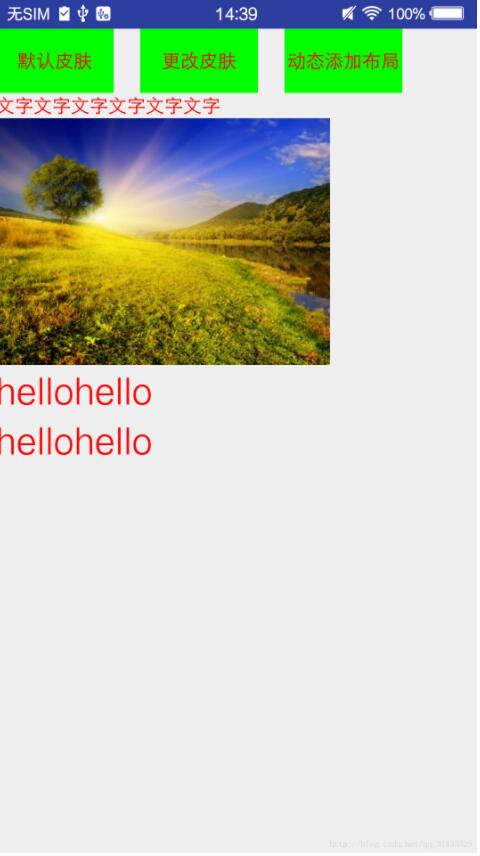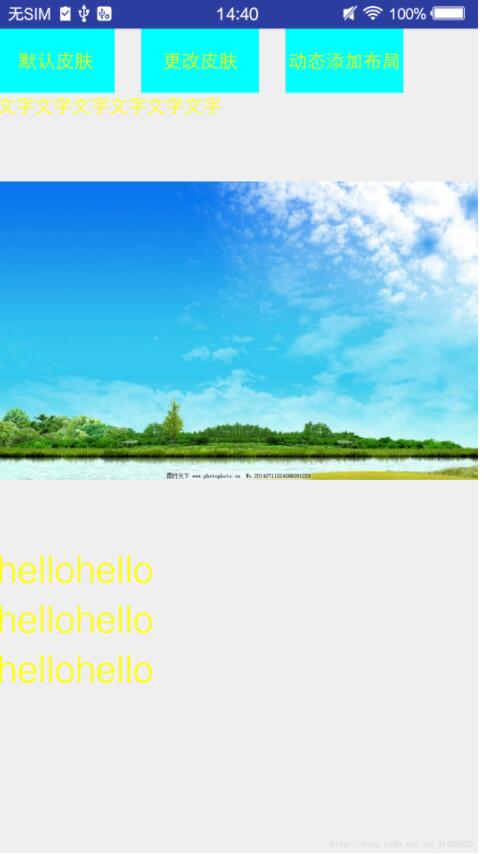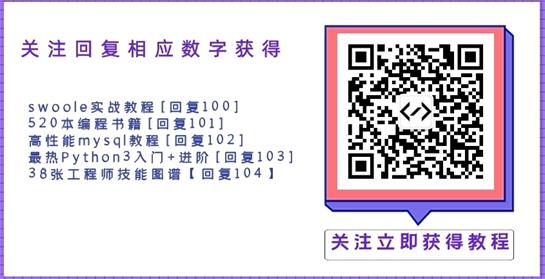skin-loader框架的换肤是通过插件化的形式替换资源文件,实现换肤效果。好处是可以在线更新皮肤换肤
Demo样例


流程
整个框架大概的流程是加载皮肤包,找到被标记的控件,通过自定义的Factory工程过滤掉其他控件,使用皮肤包中的资源文件更新被标记的ui。
使用操作
1、导入android-skin-loader框架包
androidStudio File->new->import Module选择android-skin-loader
项目右键->open Module Setting->app中加载依赖android-skin-loader库
2、在MyApplication 初始化框架
SkinManager.getInstance().init(this); SkinManager.getInstance().load();
3、需要换肤的activity需要继承skin-loader中的BaseActivity
需要换肤的控件添加skin:enable=”true”,控件xml添加命名空间xmlns:skin=”http://schemas.android.com/android/skin”
4、准备需要替换的color或drawable同名的资源文件包将其打包,重命名以.skin结尾
本地测试可以使用adb命令将.skin包放在sdcard
adb push 文件目录/test.skin /sdcard
样例代码
xml文件,使用databinding,不知道的自行百度
<?xml version="1.0" encoding="utf-8"?>
<layout xmlns:android="http://schemas.android.com/apk/res/android"
xmlns:skin="http://schemas.android.com/android/skin">
<LinearLayout
android:layout_width="match_parent"
android:layout_height="match_parent"
android:orientation="vertical">
<LinearLayout
android:layout_width="match_parent"
android:layout_height="wrap_content"
android:orientation="horizontal">
<Button
android:id="@+id/btn_default"
android:layout_width="wrap_content"
android:layout_height="wrap_content"
android:textColor="@color/text_color"
android:background="@color/button_background"
skin:enable="true"
android:text="默认皮肤"/>
<Button
android:id="@+id/btn_change_skin"
android:layout_width="wrap_content"
android:layout_height="wrap_content"
android:layout_marginLeft="20dp"
android:textColor="@color/text_color"
android:background="@color/button_background"
skin:enable="true"
android:text="更改皮肤"/>
<Button
android:id="@+id/btn_add"
android:layout_width="wrap_content"
android:layout_height="wrap_content"
android:layout_marginLeft="20dp"
android:textColor="@color/text_color"
android:background="@color/button_background"
skin:enable="true"
android:text="动态添加布局"/>
</LinearLayout>
<TextView
android:layout_width="match_parent"
android:layout_height="wrap_content"
android:textColor="@color/text_color"
android:text="文字文字文字文字文字文字"
skin:enable="true" />
<ImageView
android:layout_width="wrap_content"
android:layout_height="wrap_content"
android:src="@drawable/skin"
skin:enable="true"/>
<LinearLayout
android:id="@+id/add_layout"
android:layout_width="match_parent"
android:layout_height="wrap_content"
skin:enable="true"
android:orientation="vertical">
</LinearLayout>
</LinearLayout>
</layout>
public class SkinChangeAct extends BaseActivity{
private ActivitySkinchangeBinding binding;
//skin包名
private String SKIN_NAME = "test.skin";
//skin皮肤包的路径
private String SKIN_DIR = Environment.getExternalStorageDirectory()+ File.separator+SKIN_NAME;
@Override
public void onCreate(@Nullable Bundle savedInstanceState) {
super.onCreate(savedInstanceState);
binding = DataBindingUtil.setContentView(this, R.layout.activity_skinchange);
//更换皮肤
binding.btnChangeSkin.setOnClickListener(new View.OnClickListener() {
@Override
public void onClick(View view) {
File skin = new File(SKIN_DIR);
if(skin == null || !skin.exists()){
Toast.makeText(getApplicationContext(), "请检查" + SKIN_DIR + "是否存在", Toast.LENGTH_SHORT).show();
return;
}
SkinManager.getInstance().load(skin.getAbsolutePath(), new ILoaderListener() {
@Override
public void onStart() {
System.out.println("start");
}
@Override
public void onSuccess() {
System.out.println("onSuccess");
}
@Override
public void onFailed() {
System.out.println("onFailed");
}
});
}
});
//恢复默认皮肤
binding.btnDefault.setOnClickListener(new View.OnClickListener() {
@Override
public void onClick(View view) {
SkinManager.getInstance().restoreDefaultTheme();
}
});
//动态加载控件
binding.btnAdd.setOnClickListener(new View.OnClickListener() {
@Override
public void onClick(View view) {
dynamicAddTextView();
}
});
}
/**动态添加textview*/
private void dynamicAddTextView() {
TextView textView = new TextView(this);
RelativeLayout.LayoutParams params = new RelativeLayout.LayoutParams(ViewGroup.LayoutParams.WRAP_CONTENT, ViewGroup.LayoutParams.WRAP_CONTENT);
params.addRule(RelativeLayout.CENTER_IN_PARENT);
textView.setLayoutParams(params);
textView.setTextColor(SkinManager.getInstance().getColor(R.color.text_color));
textView.setText("hellohello");
textView.setTextSize(28);
//将动态添加的布局也更换皮肤,否则之前添加的不能更改
List<DynamicAttr> mDanamicAttr = new ArrayList<DynamicAttr>();
mDanamicAttr.add(new DynamicAttr(AttrFactory.TEXT_COLOR,R.color.text_color));
dynamicAddView(textView,mDanamicAttr);
binding.addLayout.addView(textView);
}
}
资源文件color.xml
<?xml version="1.0" encoding="utf-8"?> <resources> <color name="colorPrimary">#3F51B5</color> <color name="colorPrimaryDark">#303F9F</color> <color name="colorAccent">#FF4081</color> <color name="text_color">#ff0000</color> <color name="button_background">#00ff00</color> </resources>
skin皮肤包中的资源文件color.xml
<?xml version="1.0" encoding="utf-8"?> <resources> <color name="colorPrimary">#3F51B5</color> <color name="colorPrimaryDark">#303F9F</color> <color name="colorAccent">#FF4081</color> <color name="text_color">#ffff00</color> <color name="button_background">#00ffff</color> </resources>
对比一下,只是更改了数值,名字相同。
框架迭代,增加功能
android-skin-loader框架是没有对于src属性的修改,案例中使用imageView模拟了src的更改。
在AttrFactory中增加对于src的支持
public class AttrFactory {
public static final String BACKGROUND = "background";
public static final String TEXT_COLOR = "textColor";
public static final String LIST_SELECTOR = "listSelector";
public static final String DIVIDER = "divider";
//增加src属性
public static final String SRC="src";
public static SkinAttr get(String attrName, int attrValueRefId, String attrValueRefName, String typeName){
SkinAttr mSkinAttr = null;
System.out.println("attrName="+attrName);
if(BACKGROUND.equals(attrName)){
mSkinAttr = new BackgroundAttr();
}else if(TEXT_COLOR.equals(attrName)){
mSkinAttr = new TextColorAttr();
}else if(LIST_SELECTOR.equals(attrName)){
mSkinAttr = new ListSelectorAttr();
}else if(DIVIDER.equals(attrName)){
mSkinAttr = new DividerAttr();
}else if(SRC.equals(attrName)){
//自定义加载src
mSkinAttr =new SrcAttr();
}else{
return null;
}
mSkinAttr.attrName = attrName;
mSkinAttr.attrValueRefId = attrValueRefId;
mSkinAttr.attrValueRefName = attrValueRefName;
mSkinAttr.attrValueTypeName = typeName;
return mSkinAttr;
}
/**
* Check whether the attribute is supported
* @param attrName
* @return true : supported <br>
* false: not supported
*/
public static boolean isSupportedAttr(String attrName){
if(BACKGROUND.equals(attrName)){
return true;
}
if(TEXT_COLOR.equals(attrName)){
return true;
}
if(LIST_SELECTOR.equals(attrName)){
return true;
}
if(DIVIDER.equals(attrName)){
return true;
}
//支持src
if(SRC.equals(attrName)){
return true;
}
return false;
}
}
srcAttr继承SkinAttr定义加载src
public class SrcAttr extends SkinAttr{
@Override
public void apply(View view) {
if(view instanceof ImageView){
ImageView imageView = (ImageView) view;
if(RES_TYPE_NAME_COLOR.equals(attrValueTypeName)){
imageView.setImageResource(SkinManager.getInstance().getColor(attrValueRefId));
}else if(RES_TYPE_NAME_DRAWABLE.equals(attrValueTypeName)){
Drawable bg = SkinManager.getInstance().getDrawable(attrValueRefId);
imageView.setImageDrawable(bg);
}
}
}
}
各种控件的支持都可以自己添加。
以上就是本文的全部内容,希望对大家的学习有所帮助,也希望大家多多支持自学编程网。

- 本文固定链接: https://zxbcw.cn/post/183034/
- 转载请注明:必须在正文中标注并保留原文链接
- QQ群: PHP高手阵营官方总群(344148542)
- QQ群: Yii2.0开发(304864863)
